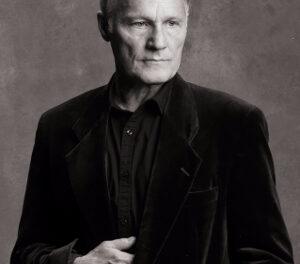Though it’s been raining incessantly the last few days, producing flash flooding on the night of this performance, close to a full house turned up nonetheless at the Porter Center of Brevard College for the Brevard Music Center’s opening opera performance by the Janiec Opera Company. Franz Lehár’s well-known operetta of 1905, The Merry Widow, was the big draw. Dean Anthony directed the production which was presented in English with English supertitles for all the sung numbers. Jerome Shannon conducted the small pit orchestra. Other production staff included Danielle Schultz (scenes), Andrea Boccanfuso (lighting), Glenn Avery Breed (costumes), Necole E. Bluhm (wigs and make-up), and Craig Brinker (sound).
Christine Browning was cast in the title role of Hanna Glawari, the enticing (and rich!) widow the Pontevedrians are hoping to marry off to one of their own, thus saving the country from financial ruin. Joshua Quinn was Count Danilo Danilovitsch, the man who ultimately wins her heart. James Eder was Baron Mirko Zeta, with Rachel Policar as Valencienne, his charming and flirtatious wife. She is pursued by Camille, Count de Rosillon (Nicholas DeMeo), who learns that Valencienne intends to remain faithful to her husband after all. Brandon Evans frequently stole the show as Njegus, the omnipresent and bustling Embassy Secretary. Others included Patrick Dean Shelton as Raoul de St Brioche, Makoto Winkler as Viscount Cascada, Skyler Schlenker as Kromov, Michael Fragale as Bogdanovitch, Elizabeth Kinder as Sylviane, Natasha Thweatt as Olga, Patrick Zurschmiede as Pritschitsch, and Caitlin Bolden as Praskowia. There were a half dozen dancing “Grisettes,” and a full chorus.
Let’s face it — the operetta is silly. The far-fetched plots, the exaggerated personae of its characters, the setting, the scenes — all lend themselves to caricature and self-parody, and there was a good bit of that in this production. The comic antics of most of the male cast looked like moves taken from recent American cinema (¡Three Amigos!). While this was probably an attempt to freshen the comedic aspect of the show, it took some getting used to, and the audience was slow to react to the first act.
With the change of scene in the second act to Hanna’s garden and the overtly ethnic slant of moves, music, and costumes, the audience warmed up considerably, especially to the all-male chorus “Girls, Girls, Girls,” each man with a tambourine, then reprised to slightly different choreography. In fact, it was the dance numbers that repeatedly brought the house down — the beautiful waltz for the ensemble near the end of act II, the raucous dancing of the Can-Can by the Grisettes (of Maxim’s, Danilo’s favorite haunt), and the achingly beautiful and tender waltz of Danilo and Hanna in Act III.
There was no shortage of spectacle with lavish costumes, and the blocking maximized the use of the Porter Center stage. It’s unfortunate, however, that the stage must be reset for each scene change well within sight of the audience (there is no curtain), who may suffer as I do with the dismantling of the illusion so painstakingly created.
It’s wonderful that BMC employs supertitles for its productions in English (in addition to foreign languages) because the diction and projection capabilities of this cast were uneven. The spoken dialogue was uniformly audible, but once the music kicked in, words and bits of whole phrases were lost. Browning portrayed a charming widow, though her upper register sounded a bit shrill and even fatigued at times. Quinn and DeMeo both fared better vocally and with easy stage manners. The ensemble between singers and orchestra was ragged at times, though the orchestral playing was excellent. Particularly noteworthy were passages in which the orchestra was reduced to a few strings and played with a sentimentality and tempo rubato so appropriate to this repertoire. Bravi tutti!











